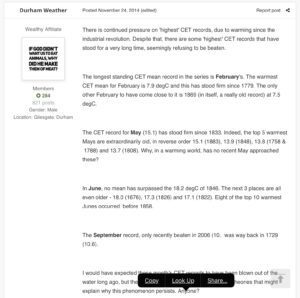Sponsor Any Post or Page on the Site. Just Contact Me to Discuss.
 This is a post I made to the NetWeather forum in November 2014 about some of the longstanding records in the Central England Temperature Series (CET). This series goes back to 1659 and is a record of temperature in the Midlands of England.
This is a post I made to the NetWeather forum in November 2014 about some of the longstanding records in the Central England Temperature Series (CET). This series goes back to 1659 and is a record of temperature in the Midlands of England.
The stations the average is computed from are very rural, so Urban Heat Island effects should not be present in the data. It is very homogenous and regarded as a very significant record when analysing today’s warming.
”There is continued pressure on ‘highest’ CET records, due to warming since the industrial revolution. Despite that, there are some ‘highest’ CET records that have stood for a very long time, seemingly refusing to be beaten.
The longest standing CET mean record in the series is February‘s. The warmest CET mean for February is 7.9 degC and this has stood firm since 1779. Previously, the only other February to have come close to it is 1869 (in itself, a really old record) at 7.5 degC. February 2024 came close to beating the 1779 record, coming in as the second warmest on the record at 7.8C.
The CET record for May (15.1) has stood since 1833. Indeed, the top 5 warmest Mays are extraordinarily old, in reverse order 15.1 (1883), 13.9 (1848), 13.8 (1758 & 1788) and 13.7 (1808). Why, in a warming world, has no recent May approached these? [Addendum: May 2024 became the second warmest at 14.1 degC]
In June, no mean has surpassed the 18.2 degC of 1846. The next 3 places are all even older – 18.0 (1676), 17.3 (1826) and 17.1 (1822). Eight of the top 10 warmest Junes occurred before 1858. The Junes of 1976 and 2023 averaged 17.0 degC.
The September record, only recently beaten in September 2006 (16.8) was way back in 1729 (16.6). [Addendum: The September 2006 record was beaten again in September 2023, which averaged 17.0]
I would have expected these month’s CET records to have been blown out of the water long ago in this era of global warming, but they haven’t been. I’d be interested in any theories that might explain why this phenomenon persists. Anyone?
The May record is an extraordinary one, being a full 1.2 degC warmer than the 2nd warmest May (1848) on record. [Addendum: recently cut to 1.0 degC by May 2024]
From Roger J Smith on the same thread, from March this year:-
Also long-standing would be some of the highest daily values.
Jan has three tied from 1834, 1932 and 2016, before 19.9 degC was recorded on 28th January 2024.
The February record only goes back to 2019.
March was broken in 1968 when 25.6 degC was recorded.
April continues to rely on 1949 (29.4C in Camden Square).
May goes back to again the first half of the 20th Century (shared by Camden Square in 1922 and Horsham in 1944; both recording 32.8 degC.
June’s record is not surprisingly held by 1976, when 35.6 degC was reached in Southampton on June 28th.
July famously broke the all time record in the UK with 40.3 degC at Coningsby in Lincolnshire on 19th July 2022.
August goes back to only 2003.
September has their record daily mean max in 1906.
October established a new mark in 1985 and that was then broken in 2011 on 1st October (29.9).
November goes back to 2015.
December was the most recent all-time value from 2015. [Addendum: This was beaten in December 2019]
Is it just a matter of time? I think the most susceptible are the February and September monthly CET ones [September was beaten in 2023]. April is an interesting example in this respect with the record of 10.6C standing from 1865 until being broken in style 142 years later (April 2007 – 11.2C), only for it to be broken again by another considerable amount just 4 years afterwards (11.8C – April 2011).
What do you think?


